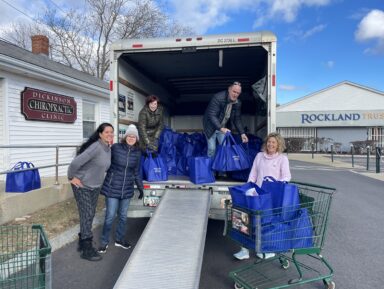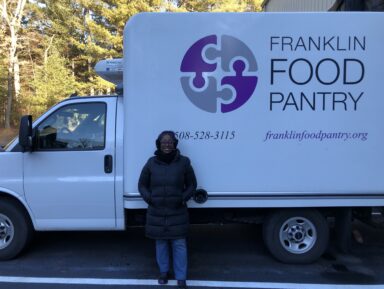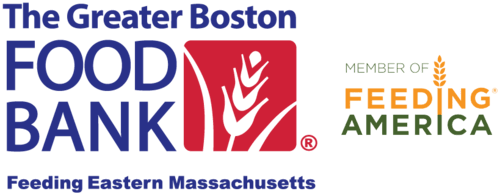GBFB Community Investment – The Importance of Grants: Tina Powderly and the Franklin Food Pantry
The Importance of Grants: Tina Powderly and the Franklin Food Pantry
Food insecurity respects few if any boundaries, particularly those of geography. One in three Massachusetts residents remains in need of food assistance – no decrease since the pandemic – regardless of the fact that the COVID-19 Public Health Emergency officially ended on May 11th. In Franklin, Tina Powderly, executive director of the Franklin Food Pantry, reports that they’ve seen a 39 percent increase in families in need since last July – from 154 to close to 200. Ninety children receive assistance through the pantry’s Weekend Backpack Program – up from 60 just last summer.
 When the numbers go the wrong way, the lifeblood provided by grants becomes even more important to a nonprofit. “They have been absolutely critical,” Powderly explains. “We wouldn’t be where we are now without them.” She points to the pantry’s five-year-old, grant-funded pilot, ‘Walk-In Friday’ – client-choice shopping – from which they’ve taken valuable lessons and strategies for the future. The program taught them that healthy produce and perishable items were key differentiators in meeting clients’ needs, prompting them to make significant investments in refrigerator and freezer space. That allowed them to carry and distribute far more frozen proteins, more milk, eggs, yogurt, cheese and produce. (In 2022, the Franklin Food Pantry served 1,103 people in 514 households, of which 255 of them were children, and 213 seniors.) “Those are extreme needs for our clients and quite expensive, so we’re really making a difference in their lives,” Powderly says.
When the numbers go the wrong way, the lifeblood provided by grants becomes even more important to a nonprofit. “They have been absolutely critical,” Powderly explains. “We wouldn’t be where we are now without them.” She points to the pantry’s five-year-old, grant-funded pilot, ‘Walk-In Friday’ – client-choice shopping – from which they’ve taken valuable lessons and strategies for the future. The program taught them that healthy produce and perishable items were key differentiators in meeting clients’ needs, prompting them to make significant investments in refrigerator and freezer space. That allowed them to carry and distribute far more frozen proteins, more milk, eggs, yogurt, cheese and produce. (In 2022, the Franklin Food Pantry served 1,103 people in 514 households, of which 255 of them were children, and 213 seniors.) “Those are extreme needs for our clients and quite expensive, so we’re really making a difference in their lives,” Powderly says.
The second major lesson? “It’s not just what you get, it’s how you get it,” she says. During the pandemic, the pantry introduced curbside distribution, which has since become a permanent alternative to client-choice shopping. Having an appointment was a point of security for some clients, they found, but sometimes a cause for anxiety for those who might be contending with children, mobility issues or embarrassment. “That’s what it’s really all about,” she adds, “meeting the clients where they are.”
 The Greater Boston Food Bank (GBFB) has been with them throughout the journey, initially providing a grant for a refrigerated box truck in 2019. The truck allows the pantry to pick up some 4,000 pounds of food weekly from GBFB, and has proved critical to their holiday programs, such as storing and delivering turkeys. In 2022, the pantry secured a second grant from GBFB for technology upgrades – conferencing facilities, laptops and more, which Powderly calls a ‘game-changer.’
The Greater Boston Food Bank (GBFB) has been with them throughout the journey, initially providing a grant for a refrigerated box truck in 2019. The truck allows the pantry to pick up some 4,000 pounds of food weekly from GBFB, and has proved critical to their holiday programs, such as storing and delivering turkeys. In 2022, the pantry secured a second grant from GBFB for technology upgrades – conferencing facilities, laptops and more, which Powderly calls a ‘game-changer.’
“I don’t think it’s overstating it to say that being a partner agency of The Greater Boston Food Bank and having access to their grant program has been absolutely instrumental to some of our  steps in meeting our clients’ needs,” she asserts. Meanwhile, Powderly and her staff continue to launch not only new programs but also major initiatives.
steps in meeting our clients’ needs,” she asserts. Meanwhile, Powderly and her staff continue to launch not only new programs but also major initiatives.
Their Weekend Backpack Program, where light meals and snacks are delivered to schools once a week on Thursdays or Fridays for students who are confidentially identified by the school nurse as being in need, star
ted as a pilot and is now found in all of Franklin’s elementary, middle, and high schools. When the school meals program was extended into the summer months, the pantry followed suit. It’s a modest number who are served by the program, but the number is growing.
In between the team focused on moving the pantry to its intentionally designed new facility less than a mile away – one with proper warehousing capabilities and full accessibility. This new space, occupied in late May, expanded their fridge/freezer ‘footprint’ from 500 cubic feet to 1,100, increasing both their scope and reach. It also required them to redesign the food pantry’s operations, as well as volunteers’ roles. Their new home means they can further meet the growing need in their community and provide even more healthy foods to nourish their neighbors.
Recently GBFB announced an additional round of Community Investment Grants. This investment will help them to further expand their capacity to provide additional healthy, nutritious food to meet the need in the community.
